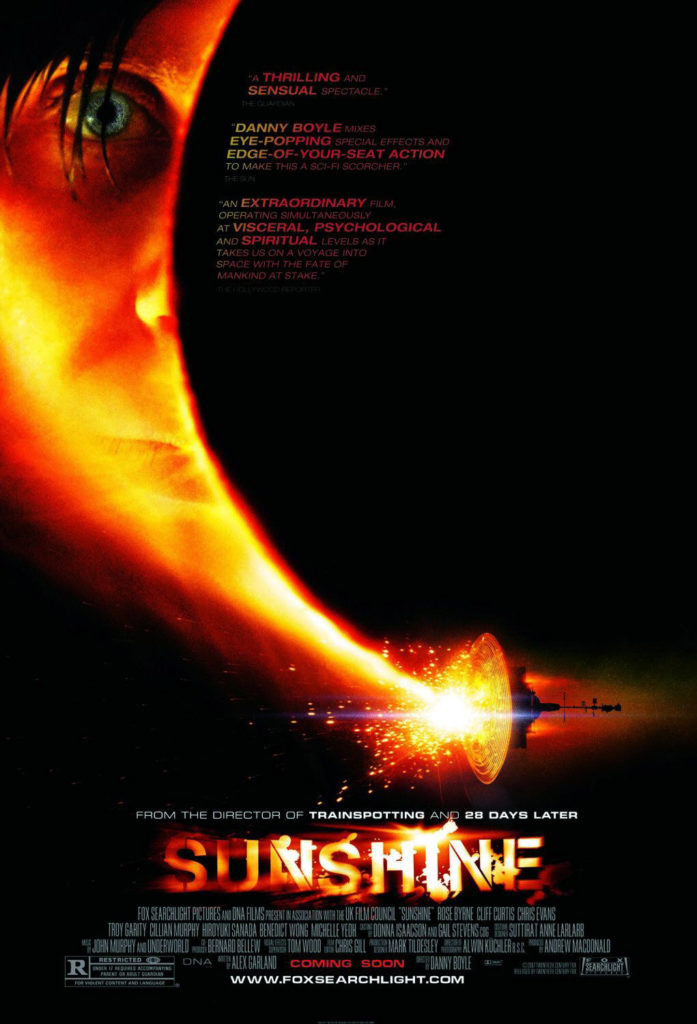Good science fiction films set in space are hard to come by. So many examples embrace the fiction part at the expense of the science that they lose a good deal of intelligence, and stupidity is death to sci-fi. Additionally, it’s a challenge to make space an interesting setting without working around so many of the realities that make space not only the most challenging environment there is for human existence, but also the most boring. There’s a reason, after all, that space shuttle launches are broadcast on C-SPAN.
That is to say, there needs to be a balance between scientific plausibility and workable plot. Skew too far one way and you get Armageddon, skew the other way and, well, I don’t think that film has been made. Even the most realistic space films always introduce an unexpected wrinkle, something the hapless crew has to improvise their way through, with varying degrees of success for both the characters and the filmmaker.
Unexpected is the operative word when it comes to Sunshine, from director Danny Boyle and writer Alex Garland. The happenings that drive the story are unexpected, and they come at a furious pace, making the lives of the film’s characters hardly enviable.
In the near future, the sun is dying, bringing on a deep freeze to the earth that will soon result in the extinction of life. The story follows a spaceship, Icarus II, and it’s crew, sent on a mission to drop a gigantic fission bomb into the sun to reignite it, thus  saving the world. The set-up here is standard fare. Eight crew members are locked aboard a vessel creeping its way through the blackness. There’s the requisite amount of strain and claustrophobia, roles are established for the benefit of the audience, and after a short stretch of character development, things begin to happen. And they never let up.
saving the world. The set-up here is standard fare. Eight crew members are locked aboard a vessel creeping its way through the blackness. There’s the requisite amount of strain and claustrophobia, roles are established for the benefit of the audience, and after a short stretch of character development, things begin to happen. And they never let up.
After one of the crew, Capa (Cillian Murphy), makes a recommendation to alter the mission plan, nothing goes right for the crew of the Icarus II. Boyle and Garland place deadly obstacle after deadly obstacle in front of the characters to prevent them from completing their mission, not just dooming them, but dooming the entire human race as well. This factor ratchets up the tension, investing the audience in the lives of the protagonists up on the screen. Of course it’s not real, but it’s stomach churning to watch these men and women just barely escape from a critical predicament only to be confronted by another. It is also just glorious tragedy that so much of their misery is self-inflicted.
By the end of the film, most of the cast has been dispatched, in unique and surprising ways, and the only way for the pall, the ghastly tension that menaces the film, to be lifted is if somehow, someway, the remaining survivors can complete their mission and save the world.
Ever present throughout is the sun. It holds a sublime audience in the film, as indeed everything the crew does is for its benefit, and it sometimes becomes a character in its own right. At least one crew member in Sunshine thinks the sun has something to say, literally.
Boyle and company shot the film beautifully. CGI was well done and far from overwrought, and the production design was excellent. Boyle knows how to make a good-looking film, and Sunshine is no exception. The cast, including Murphy, Rose Byrne (Cassie), Cliff Curtis (Searle), and Chris Evans (Mace), is generally good, with a couple weak spots here and there. The small cast means the weaker readings stand out a little more, but there’s nothing fatal. Garland’s screenplay plays a role in this at times, spouting out random shots of cheese that surprised me some.
When Sunshine was released, it didn’t do too well at the box office. Most reviews gave it a middling rating, and for the most part, audiences stayed away. This is a conundrum. Sunshine is a fine film. I can only speculate that some viewers may have a problem with its deliberate pace, or with the plot, which can get oppressively dark at times.
The science, as hinted at earlier in the review, is suspect. But it does not matter. As ridiculous and fantastical a scenario as Icarus’s mission is, all the foibles that defy what happens in text books are part of a very good story, and everything looks plausible enough that if it does produce any eye-rolling, then the viewer is taking things a little too seriously. Some of the familiar culprits show up (sound in space, gravity aboard ship, etc.), but none of that prevents the viewer from being lost in the story. Sunshine does indeed hit that perfect balance between science and fiction.
